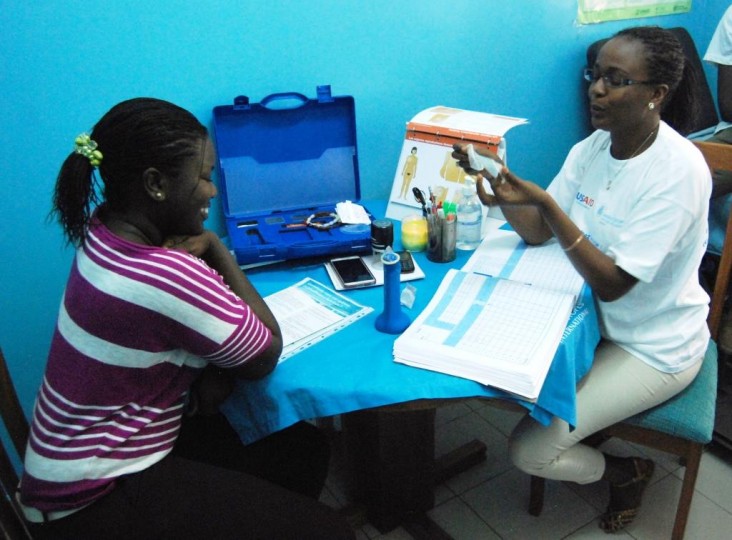
March 2015—With young people representing more than 45 percent of Senegal’s population, reaching youth with family planning and safer sex messaging has been a priority for the Senegalese Government, spurring them to develop a national youth reproductive health strategy.
The national strategy, which went into effect last year, focuses on providing appropriate, accessible communication and resources for youth, including new technologies; and developing confidential health service sites suited to the needs of adolescents in hospitals and health centers.
In Senegal, 37 percent of women aged 20 to 24 are sexually active, but only 11 percent use modern contraceptive methods.
Within the walls of Dakar’s Cheikh Anta Diop University (UCAD) is a small youth reproductive health clinic, supported by USAID since 2012. Here, students can receive family planning counseling, care for sexually transmitted infections (STIs), and ask questions confidentially about their reproductive health.
The clinic is operated by Maimouna Ba, a young midwife recently graduated from school herself, with the assistance of 20 peer educators. The goal of Ba’s work: help improve the sexual health of UCAD’s 80,000 students, the majority of whom have left their rural villages for the first time to study at the largest and most prestigious university in Senegal.
At the clinic, Ba sees an average of 30 students per day. She has a lot to listen to: Many of the youth she counsels have little knowledge of their own bodies or how to prevent pregnancy.
“So many of the students here have come from the rural areas. They’ve never been taught about reproductive or sexual health,” says Ba. “In Senegal, the topic is taboo—many of them are confused and fearful, and it often takes several consultations before I earn their trust.”
One such patient is Ami*, a 26-year-old economics student from the central region of Fatick in her fifth year of study. The night before Ami’s visit, she had had unprotected sex with her boyfriend and was hoping to get a prescription for the morning-after pill.
During the consultation, Ami revealed that she had never used anything but emergency contraception. “I am afraid of what the rest of society will say,” she said. “Even on television, contraception is just for married women.”
Ba disagreed, saying, “Contraception is necessary to protect your health. It’s for everyone.” She then demonstrated the many types of contraceptives Ami could choose from.
Ami is not unique in knowing very little about her family planning options or about how her body works. This is especially evident in the rates of untreated STIs among clinic patients: Almost 70 percent of clients are diagnosed with STIs.
“All the girls desire reliable, discreet forms of contraception,” says Ba. Indeed, 52 percent of the contraceptives USAID provides through the clinic are for long-acting products like Jadelle (an implant) or the IUD.
“I’ve never talked with anyone about sex like that before. I thought it would be terrible—but it was really easy. She [Ba] was so direct. I am so relieved,” said Ami.
Satisfied female clients like Ami have been a powerful source of advertising for the clinic. In fact, 77 percent of the clinic’s clients are generated by referrals.
The other 23 percent are generated by USAID-supported peer educators who visit the 1,900 dorm rooms of the university, conduct activities on campus streets, post updates on the clinic’s Facebook page, and even host concerts with USAID support. In 2014, the students conducted more than 2,400 home visits and hosted over 150 discussion sessions.
“While talking about reproductive health is difficult, when you offer services for free in a confidential environment, people want to take advantage,” says Amina Sene, one of the peer educators.
Despite the clinic’s success, challenges remain, including expanding staff and adding peer educators for the nearby high school. However, the priority is to maintain the existing strengths of the clinic: its confidentiality, sympathetic care providers and quality services.
As part of USAID's Marie Stopes International-Support for International Family Planning Organizations program, the UCAD clinic is the only USAID-supported family planning clinic located on a university campus. The Agency also supports youth sexual health through its HIV/AIDS and health services improvement programs.
*Full name withheld to protect privacy.
LINKS
Follow @usaidafrica, on Facebook, on Flickr, on YouTube







Comment
Make a general inquiry or suggest an improvement.